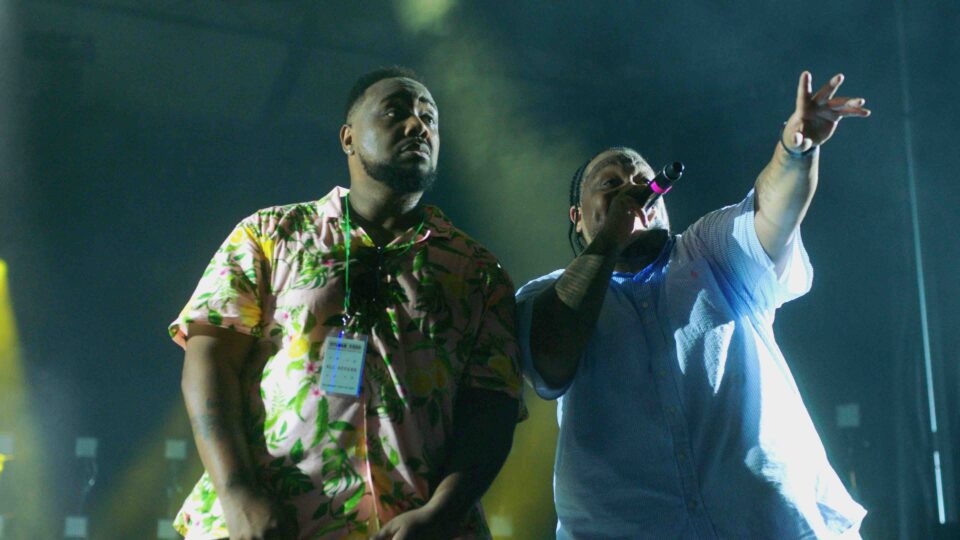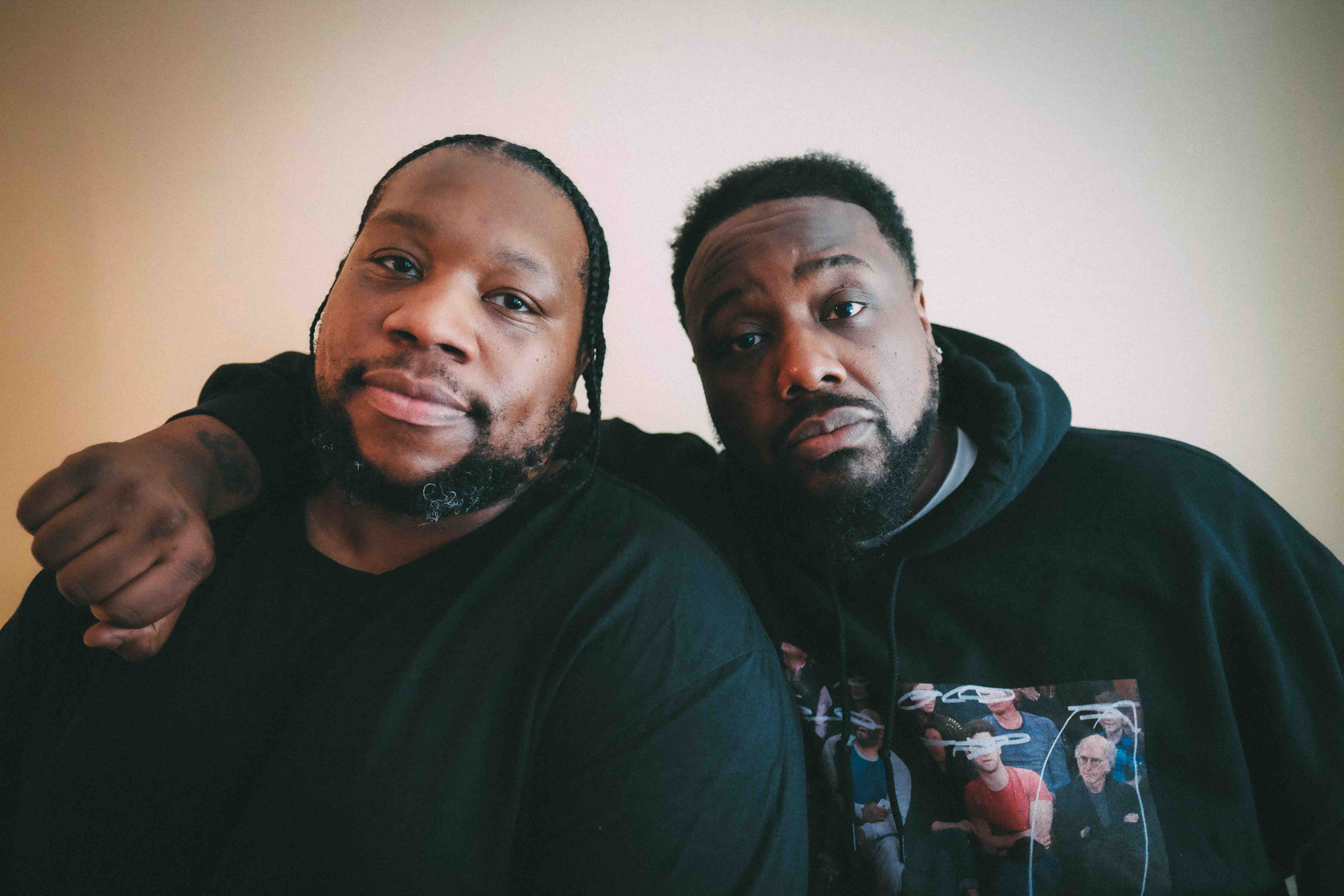Little Brother was an anomaly. The North Carolina–based trio comprised of emcees Phonte and Rapper Big Pooh and producer 9th Wonder emerged from a region that was, at the time, best known on a national scale for the raucous rhymes of Petey Pablo. Little Brother stood at the opposite end of the sonic and thematic spectrum, crafting stories about day-to-day life and just trying to get by.
Yet the group’s debut album, 2003’s The Listening, struck a chord with legions of rap fans who gravitated toward their everyman tales. Phonte and Rapper Big Pooh presented the side of reality rap where the focus was on the working man rather than the corner. Their sensibility worked well with 9th Wonder’s sample-driven compositions, which stirred the soul and kept the focus on the wordsmiths.
Ahead of their brief headlining US tour celebrating 20 years of The Listening, remaining members Phonte and Rapper Big Pooh reflect on creating their debut, the inspiration for the song “Speed,” and how others in their circle struggled to understand their status in the music industry.
Now that The Listening is 20 years old, the treadmill lifestyle as depicted in “Speed” is still sadly accurate.
Phonte: Now it’s that my Peloton lifestyle ain’t working for me.
What was the genesis for the idea back then, and why was it so profound to you to break it down as you did on that song?
Phonte: “Speed” was the first song we recorded as a group, and for me that was my life at that time. I had a job working at a call center for an insurance company. It was trash, horrible. It was my first job out of college. At the time, I was living with my girlfriend and my son, who was two. I remember waking up every morning, coming home. Waking up, coming home. Waking up, coming home… I just remember thinking, “Yo, I cannot live this way, I can’t just go to this job that I hate, come home, and try to be present for my girl and my son. This music that I love making with my brothers, that’s my only piece of happiness. Nah, I want to do this all the time.”
So writing “Speed,” that was where that came from. “Another day to face / Of sharecropping in this paper chase.” That’s what it was.
“We were broke as fuck making that record... My thing was, ‘This makes me happy, and I just want to do the things that make me happy. Period.’” — Phonte
Rapper Big Pooh: My verse was more just talking about what was going on as I was trying to figure out my place as far as making music. I was living in Charlotte, so I would catch the train, stay with ’Tay. Then we would drive from Durham to Raleigh to record and just try to figure it out. I was trying to balance school and making music, asking myself, “Do I really want to do this, and am I good enough to do this?” My “Speed” verse is about the inner battle of, “This isn’t all my life is going to be, I think it’s supposed to be over here.” It’s about taking that chance.

So what was the catalyst to break out of that cycle?
Phonte: When we started recording The Listening, I saw what we were making and it was just something that I really believed in. It wasn’t from the standpoint of, “Yo, this could make us a lot of money.” You’re always, of course, thinking about money. We were broke as fuck making that record. We weren’t making money while we were making the record, either. My thing was, “This makes me happy, and I just want to do the things that make me happy. Period.” When we were making the record, that was what gave me that push.
We made the record and we were broke. Then the record comes out and people actually love it—and we were still broke [laughs]. But I was still happy through that. I was like, “Yo, we did this, let’s keep going.” That was what gave me [the confidence to] quit my job. The last job I worked was in 2002. I was working at Belk. The record was out. Things were kind of going and I was liking where I was at in life, so I was like, “Fuck it, I’mma go for it.”
“I clearly remember going to a club and not being let in while they were playing our song inside.” — Rapper Big Pooh
Rapper Big Pooh: I was 21, 22 years old. I’m not a spontaneous person, necessarily, but I’m a person who recognizes the vibes. I was like, “This feels like something, let’s just see where this goes.” Because I have no responsibilities to anyone other than myself, if this falls off the cliff, then I can always go back and get a job and finish school. But if this thing takes off, then here we go. A big part of it for me at that time was I had nothing else to worry about. I had no one else to take care of. That was the biggest thing for me. It was like, “This is your time to take that chance,” because you get later in life and you get responsibilities.
The other big thing for me is that I had people who I was with—Phonte, for example—who felt like this was his destiny, his calling. I had never been around people like that, who felt that strongly about making music being their life, that that was gonna be their career. That was like energy for me. I was like, “Y’all think we really can do this? We ain’t coming from New York or LA, but y’all really think we can do it.” They were giving me energy and fuel to really get comfortable being uncomfortable.
Speaking of being comfortable being uncomfortable, regardless of what record label an artist is on, I think there’s a misconception about what comes with that. Listeners think that if you’ve got a record out, you’re rich—even if your raps are saying the direct opposite. What was that like to deal with?
Phonte: Oh, man. I knew that one really well. Where I saw that dynamic show up the most was in our city amongst a lot of other rappers in the scene. There was conversations I had to have years down the line with other emcees. I had to let them know, “I know y’all might have thought back then y’all were looking at us like the big dog. We were signed, and in this magazine, and you’re feeling like maybe we didn’t do enough to give back. But it wasn’t like that for us.”
“A rap group from Raleigh/Durham, North Carolina, signing to a major label—that’s like the biggest thing that’s happening in everyone’s life at that time.” — Phonte
That was one of the earliest lessons that I learned. I always stressed to artists—and I think they have a better understanding of it now—that this game would make you famous way before it makes you rich. We’re coming from a small community. If a rap group gets signed to Atlantic from Brooklyn, who gives a fuck. That’s like any day that ends in “Y.” A rap group from Raleigh/Durham, North Carolina, signing to a major label—that’s like the biggest thing that’s happening in everyone’s life at that time.
Rapper Big Pooh: For me, it wasn’t even a money thing at that time. It was more of an opportunity thing. It’s like, “I can’t give you an opportunity I don’t even have [laughs]. I’m still trying to take advantage of this opportunity I was given. I may be ‘on,’ technically, but I ain’t in the door yet.” That was the biggest thing, people not understanding that the opportunities that they may have thought were present for us at that time really weren’t. We were still very much outsiders, even though they’d kind of let us in the club. I clearly remember going to a club and not being let in while they were playing our song inside. I can’t even get through the door. How am I gonna pull somebody else through? FL







